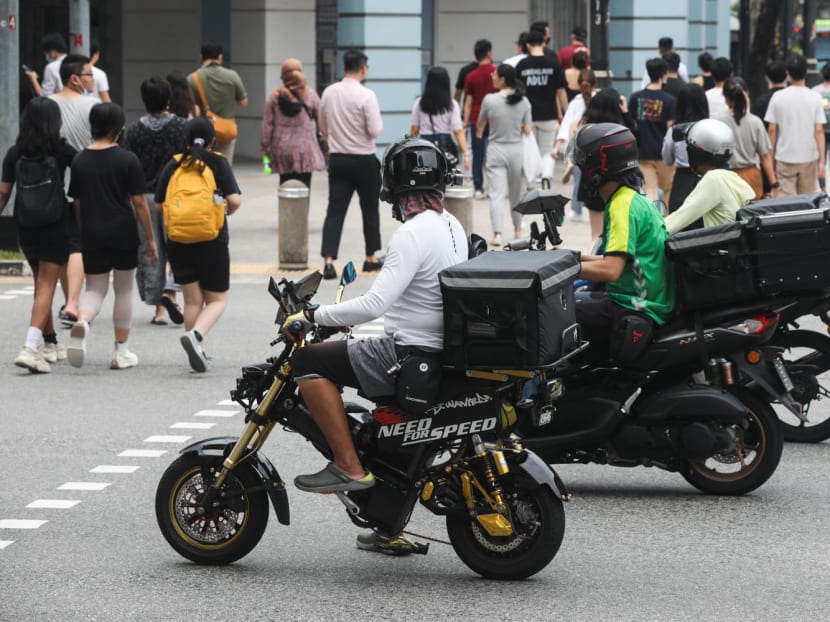Food delivery riders 'susceptible to accidents' but 3 in 4 lack adequate savings: IPS study
SINGAPORE — Only one in four food delivery riders has enough savings to take care of their personal and family’s needs for the next three to six months should they stop working, a report by the Institute of Policy Studies (IPS) found.

- A study by IPS found that only one in four food delivery riders have sufficient savings to take care of their needs for the next three to six months should they stop working
- Researchers surveyed 1,002 food delivery platform riders from July to August
- They found that those who spend more hours doing food delivery work are more likely to have been in at least one accident
SINGAPORE — Only one in four food delivery riders has enough savings to take care of their personal and family’s needs for the next three to six months should they stop working, a report by the Institute of Policy Studies (IPS) found.
Published on Friday (Nov 4), the report also called for better social protection for riders as many face high accident rates over the course of their work.
Those riders who spend more hours doing food delivery work are more likely to have been in at least one accident.
The study was carried out by Dr Mathew Mathews, Ms Thian Wen Li, Ms Clara Lee, Mr Shamil Zainuddin and Ms Mindy Chong of IPS.
They surveyed 1,002 food delivery platform riders from July to August. Respondents were aged between 21 and 65 who obtained at least a quarter of their monthly income from food delivery riding.
According to the study, one of the main factors contributing to the lack of savings is the need to pay for their or their family’s living expenses.
More than three in five respondents (62.9 per cent) reported not having enough savings due to their own or their family’s living expenses taking up almost all, if not all of their monthly income.
This is especially so for riders with lower personal and household incomes, said the report.
For middle-aged riders, factors which contribute to their lack of savings include caring for their families’ needs, paying off housing loans, or having existing debts that contribute to their lack of savings.
MORE SOCIAL PROTECTION FOR WORKERS
The study found that 38.3 per cent who rode for 51 hours and above a week had met with at least one accident.
Speaking to reporters at a media briefing on Friday (Nov 4), Dr Mathews, the head of Social Lab at IPS said: “So it does make it clear to us that if you take this job fairly seriously and put in quite a lot of hours to get what would be a decent wage, then you are susceptible to accidents.”
“So it does make it clear to us that if you take this job fairly seriously and put in quite a lot of hours to get what would be a decent wage, then you are susceptible to accidents.Dr Mathew Mathews, one of the study's authors”
He added that this could have an effect on not just endangering one’s life but also limiting the income one could earn after that.
“So this again becomes very clear that you need some kind of protection [for the delivery riders],” he said.
Dr Mathews said that this could be in the form of delivery platforms finding ways to reward those who follow the rules, which protect platform workers and the broader community.
“One of it being having riders keep to speed limits, something they may breach because they feel they need to get enough orders,” he said.
About 17.7 per cent of riders who use e-bikes, power-assisted bicycles and motorcycles to deliver food ride "faster than normally allowed" to earn more money from more deliveries, which increases their likelihood of getting into accidents that require medical attention.
THE INCOME DISPARITY
The study found that the income of food delivery riders ranges from less than S$1,000 a month (23.6 per cent) to around S$1,925, which was the median income.
Only a very small proportion (3.2 per cent) earn S$5,000 and above a month.
The number of hours riders spent on food delivery work varied drastically, with over two in five riders (40.6 per cent) working more than 44 hours a week.
“The wide variability of income and working hours can be attributed to the uncertainty of food delivery work in terms of waiting times and allocation of jobs,” the researchers wrote.
More educated and middle-aged riders tend to earn more per hour of work and there is a perception among delivery riders that those possessing higher education are able to employ strategies that allow them to maximise their earnings.
Ms Thian, a research associate at IPS, said that based on observations in the study, these strategies include going to the “correct spots” at the “right time”, or working alone instead of with other riders.
Dr Mathews added that middle-aged riders may have more experience from their previous jobs which may better help them develop such strategies.
A pressing worry held by about 68 per cent of food delivery riders was that they would not be able to earn enough because there were more riders.
“The number of people joining the food delivery industry as riders outpaces the demand for food delivery services, thus affecting existing riders’ earnings.
"This increase in competitiveness, coupled with the decrease in incentives provided by food delivery platforms has also led to riders having concerns about earning enough from food delivery work to cover the increasing cost of living,” the researchers wrote.
CPF CONTRIBUTION
Just over half of survey respondents (51.2 per cent) wish to have Central Provident Fund (CPF) contributions from their food delivery work, with younger and newer riders more likely to feel this way.
A total of 55.6 per cent of riders in their 20s, 49 per cent in their 30s, and 51.9 per cent in their 40s wanted CPF compared to 43.9 per cent of riders who are 50 years old and above.
But a worry expressed by almost half of riders who were not keen on CPF contributions is that they will significantly reduce their income earned.
On this issue, Dr Mathews said: “If CPF is going to be mainstream, you can expect that there will be some within the rider community who will be upset because it will impinge on what they would have in terms of take-home (income).
“But I think this is something that needs to be balanced with the bigger issue about citizens being self-reliant…Some kind of system needs to kick in to guide workers about the fact that social protection is important.”








